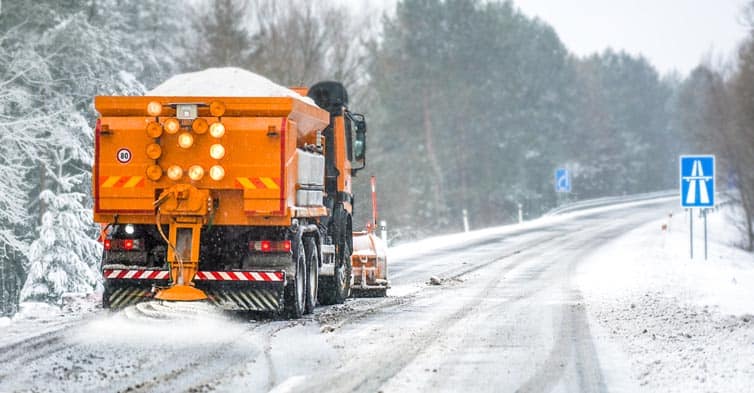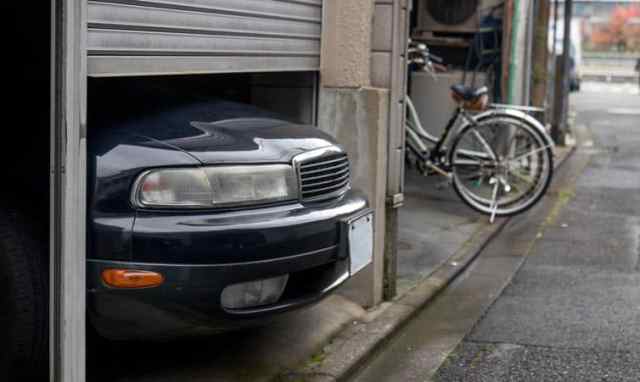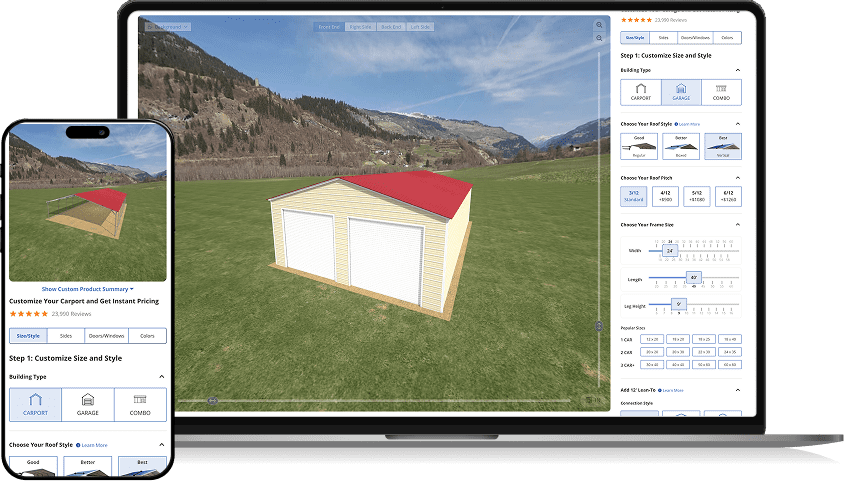The day after Thanksgiving, Ryan stepped out the front door on his way to work. To his surprise, his car wasn’t in the driveway.
After a moment of thought, he realized that his Honda Civic had been stolen.
Reporting the theft was a pain, and so was getting a ride to work. More then a week later the police found the car by the side of the road, several miles out of town. It had been stripped and abandoned. The thieves were never found.
After that, Ryan cleared out his garage and began diligently parking inside.
It is a familiar story. Like my friend Ryan, most of us don’t take precautions to protect our vehicles until after we have suffered loss. But perhaps you prefer to learn from others mistakes, rather than make your own.
Benefits of Parking Your Car in a Garage
There is one big reason why many people don’t park in their garage. I’ll get to that in a moment, but first let’s consider all of the reason why you might want to park inside your garage instead of on the street.
Reduce the Risk of Theft
Parking your car in a garage and closing the door is a deterrent to thieves casing the area. It’s a lot more trouble to try to get inside a garage to search a car for valuables than it is to get into a car parked outdoors. I like the idea of enjoying a little extra peace of mind.
Don’t think your car is too new—or too old—to be stolen.
Like Ryan’s older Honda Civic, many older cars lack car alarms and can be unlocked and stolen using shaved keys and other tricks.
Many newer cars have key fobs designed to prevent theft. But these cars are also being stolen when owners accidentally leave the key fob in the car. Other people have had their cars stolen when they left them running to warm up on a cold morning. Storing your car in the garage will keep your car safe at night even if you forget the key fob inside—and there is no need to warm up your car except on the coldest mornings.
Top 10 Stolen Cars, 2010-2020 (source):
- Honda Accord
- Honda Civic
- Ford Pickups (Full-Size)
- Chevrolet Pickups (Full-Size)
- Toyota Camry
- Dodge Pickups (Full-Size)
- Nissan Altima
- Toyota Corolla
- Dodge Caravan
- GMC Pickups (Full-Size)
In recent years there has also been a huge spike in catalytic converter thefts across the nation. Catalytic converters clean up some of the harmful emissions that come out of your exhaust. They contain precious metals that can be resold for lots of money, and replacing a catalytic converter usually costs more than a thousand dollars.
Some studies suggest that the legalization of recreational drugs like marijuana may lead to an increase in auto thefts. Even if theft isn’t a big problem in your neighborhood now, it might become a problem later.
Lower Car Insurance Rates
Keeping your car in the garage saves it from wear and tear and lowers the risk of theft. Sometimes you can get a reduction in your insurance rate simply by keeping your vehicle in a garage.
Protect Your Car from All Types of Weather
Keeping your vehicle under the shelter of a garage is always better than parking it outdoors. Even if you don’t have any snow or extreme weather conditions in your area, you’re still preventing the rain and harsh sunlight from bearing down on the exterior of your car or truck. Plus, parking your car in the garage gives rodents less opportunity to make a home in your wheel wells and chew on your vehicle’s wiring. And just as importantly, birds have less chance to relieve themselves on your car’s windows and paint job.
Here is a list of outdoor hazards that can wear on your car:
- Sun exposure causes paint to bubble, crack, chip, peel, and fade. It also causes interior materials to crack, fade, and warp. A windshield sunshade can provide some protection for your interior. Wax can help protect your paint. But the best protection is to park in a garage.
- Heat dries out tires, causing them to be brittle and more likely to blow out. It can also cause the water in your battery to evaporate which exposes the lead plates and reduces the cranking power. Gas also evaporates faster in heat, reducing fuel economy.
- Temperature fluctuations can cause car paint to expand and contract, causing cracks for moisture, salt, and chemicals to infiltrate, leading to rapid deterioration. Wax can help, but parking in a garage is the best solution.
- Acid rain is particularly a problem in the Northeastern US due to air pollution. Acid deposits interact with sunlight and eat away at paint and metal. Parking in a garage can keep your car safe. You can also get a car wash after rains.
- Hail can dent and damage your car. In some places, large hailstones have even smashed windows.
- Wind batters vehicles with particles that wear away paint over time. In a garage your car is protected.
- Bird droppings contain acid that can eat through a vehicle’s protective layers and reach the metal in as little as 48 hours in hot weather. If your car gets hit, get a car wash. Seltzer can be used to remove waste on the windshield, but do not use it on paint!
- Sap etches through your car’s clear coat over time, causing staining and discoloration. Be sure to quickly wash off sap with hot water before it hardens or use a commercial product like Goof Off or Turtle Wax. Better yet, park your car in your garage away from trees.
- Sand, dust, and pollen can clog air filters, reducing fuel economy, and cause problems for the air conditioning system and the health of passengers. If someone writes a message on your dirty car, it can cause scratches. Regular car washes can help, and parking inside can help keep your car clean.
- Mold and algae can grow on your car if it left in a humid area without much light, like a shady area under trees in the South.
- Ocean winds that carry salt particles are extremely corrosive. If you live near the ocean, keep your car in the garage when not in use.

Don’t Waste Time Scraping off Snow and Frost
Is it time to get the old scraper out for another winter of cleaning the snow and frost off your car windows? If you park in a garage, you can skip the morning scraping routine. That’s certainly a great benefit of having a sheltered place to keep your car.
Do Your Car Maintenance Inside
Changing the oil, refilling the windshield-washer fluid, and vacuuming the interior are just a few of the maintenance tasks that are a lot easier to complete in the well-lit, dry, and relatively warm interior of a garage.
Other Benefits of Having a Garage
Enhance the Look of Your Property
Having an attractive garage paired with your home makes your property look more complete. Not only does your garage serve a practical purpose, but you can choose one in a color and style that complements your home’s design. If you ever decide to sell your home, potential buyers are sure to notice and appreciate your garage.
Create a Workshop
If you’ve always wanted to set up a workshop for repairing household items, woodworking, or pursuing another hobby, a garage provides you the shelter and space to explore your interests. What a great reason to take on a new hobby!
Extra Storage Space
When you have a garage, you have a place that’s perfect for your car and dozens of other things you need to store. Many people like to keep a freezer in their garage to store frozen foods that don’t fit in the house.
The Main Benefit of Parking Outside
The number one reason people who have a garage park outside is because their garage is too hot or full of other stuff. Should you leave you expensive automobiles are exposed to the destructive weather so you can protect piles of old and broken items in your garage? It depends on what you value more.
According to Kelly Blue Book, the average new car costs more than $36,500. This staggering number is compelling drivers to put effort into maintaining the longevity of vehicles. Little damages add up over time, especially if you live in a region prone to inclement weather. If your garage is too full to park a car inside, maybe it’s time to clean out the garage.
Dealing with Salty Roads
According to AAA, road salt causes over $3 billion in vehicle rust damage annually. Repairs to fix these damages average nearly $500 per occurrence.
Seventy percent of Americans live in areas affected by snow and ice. Road salt can cause rust damage to breaks, fuel tanks, exhaust systems, and other critical vehicle components.

If you want to protect your car from rust, its best to keep it in the garage when salt is on the road and drive a less expensive vehicle if you have one.
If you must drive a car on salty roads, be sure to wash the undercarriage of your car before storing it in the garage for the night. The lack of wind to dry your car and the warmer temperatures in your garage will allow the salt to do more damage at night than if the car was left outside in the freezing weather. Another option is to have a rust-proofing treatment applied to the undercarriage of your car to minimize rust damage during the winter season.
Tips for Storing Your Car Long-Term
Some cars are perfect for driving over snowy roads during the wintertime while other vehicles are better off taking a long winter’s nap. If you have a car that you prefer to store in the garage during the winter, there are a few things you can do to maintain its condition and keep it safe from damage.
Here are some essential tips to prepare your car for long-term garage storage:
- Wash the Car First. If you store your car when it is dirty, the grime on your car can harden and cause damage.
- Fill Up the Gas Tank. Storing a car with little to no gas in it allows moisture to form inside the tank. This can cause the tank to corrode or rust. However, when the gas tank is full, there is no space for moisture to form inside it.
- Put in Fuel Stabilizer. After filling the tank with gas, put in some fuel stabilizer. A stabilizer will prevent the liquid inside the car’s fuel lines from hardening or becoming gummy. Be sure to drive around for a little while to allow the fuel stabilizer to make its way through the car’s system.
- Change the Oil and the Filter. A fresh supply of oil along with a new filter prevents corrosion from occurring inside a car’s fuel lines and engine throughout the winter months.
- Change the Coolant. Replacing old, contaminated coolant in a car helps to prevent corrosion and problems with the radiator.
- Block off the Tailpipe. Putting steel wool in the tailpipe of your car prevents mice from making a nest in that that hole.
- Place Mothballs on the Garage Floor. This is another way to discourage rodents from invading your car. Put a few mothballs or mint leaves near the car doors as well as in front of and behind the vehicle. The odor of the mothballs can stop rodents from approaching your car.
- Raise the Car Off Ground. Using a car jack and jack stand, raise the front of the car off the ground to prevent flat areas from forming on your tires. Make sure the car is stable on the jack before leaving the garage. If you aren’t comfortable with raising your car, I suggest you put more air in the tires without exceeding the maximum amount. Your tires will lose air as your car sits in the garage over the winter.
- Remove the Battery. A car battery loses power over time even if the car is never on the road. It’s a smart idea to remove the car’s battery, clean the corrosion and dirt off the terminals. You may need to hook the battery to a charger occasionally.
Check out our long-term storage tips for motorcycles too!
Dangers of Using Car Covers
A car with a car cover over it tends to attract attention from people passing by. Is it a sporty little number from the 1960s? Or, maybe it’s a late model luxury car that’s practically a member of the family. One thing is for certain, a vehicle with a car cover is valued by its owner. But, does a tarp offer a car an adequate amount of protection when it’s parked out in the open air?
There are plenty of problems that can arise if you throw a car cover over your car and leave it parked outside in your driveway or yard. For one, a cheap car cover may not fit your car well. I wouldn’t recommend just buying the first car cover you find without properly researching. A car cover that is too big can flap around in the wind, rub against the sides of the car, and damage the paint job. If a car cover is too big for a vehicle, it can also blow off the car leaving it exposed to nature’s elements.
A car cover that’s too small doesn’t provide complete cover for the vehicle. Moisture can form under a car cover that doesn’t perfectly fit your car, which can result in mold growth. If you don’t check your car on a regular basis this mold growth may continue for weeks or even months.
Car covers made from cheap materials can scratch your car. You should also avoid putting a car cover over a car that isn’t clean, because even a good cover can cause dirt on your car to rub against the paint, causing scratches.
Can’t Afford a Garage? Consider a Carport
A car parked under a carport has protection from the snow, rain, hail, wind, and sun. A carport even usually keeps the frost off an uncovered car! Parking a car under a carport also allows for easy access to the vehicle. It’s not as good as parking in a garage, but it’s certainly better than parking on the street.
Wherever you decide to park your car, a little diligence can go a long way in keeping our car in good condition.




